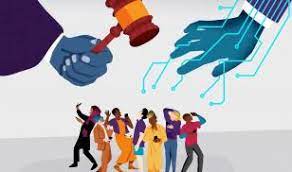Usuarios del Club TRPlane
La Corte Suprema de Estados Unidos está examinando una ley breve pero potente esta semana que, si se modifica, podría reorganizar la Internet moderna.
La Sección 230 de la Ley de Decencia en las Comunicaciones protege a las empresas de Internet de la responsabilidad por el contenido generado por el usuario que alojan y se ha convertido en un nexo poco probable de controversia en los últimos años.
El martes, la Corte Suprema escuchó los argumentos orales en González contra Google. Ese caso, presentado por la familia de Nohemi González, víctima de los ataques terroristas del Estado Islámico en París en 2015, argumenta que Google debería ser responsable del contenido terrorista promocionado en YouTube que precedió al ataque.
El miércoles, el tribunal escuchó un caso paralelo que culpa a Twitter por otro ataque terrorista mortal, en este caso, uno que resultó en la muerte de Nawras Alassaf, quien fue asesinado después de que un hombre armado del Estado Islámico abriera fuego en un club nocturno de Estambul en 2017.
Los demandantes en ambos casos argumentan que las plataformas tecnológicas en cuestión deberían enfrentar responsabilidad legal por el contenido del Estado Islámico que alojaron o promocionaron en el período previo a los ataques que en conjunto se cobraron más de 150 vidas.
Los jueces de la Corte Suprema se enfrentaron al argumento del peticionario de que cuando YouTube ofrece contenido a los usuarios a través de su algoritmo de recomendación, en realidad constituye un tipo de actividad diferente a la mera alojamiento ese contenido, uno que no está protegido por la Sección 230.
“Nos estamos enfocando en la función de recomendación, que están recomendando o sugiriendo afirmativamente contenido de ISIS, y no es mera inacción”, dijo el abogado Eric Schnapper, quien representó a la familia de González en los argumentos orales del martes.
La idea de que la Sección 230 podría tener excepciones no es nueva, pero es controvertida. En 2018, un proyecto de ley conocido como FOSTA creó una excepción a la Sección 230 que aparentemente estaba diseñada para reducir el tráfico sexual, pero desde entonces ha enfrentado críticas por hacer el trabajo sexual más peligroso.
La Corte Suprema no es la única entidad gubernamental que evalúa la Sección 230, aunque los esfuerzos para desmantelar la ley o hacer que sus protecciones vengan con condiciones se han estancado en gran medida en el Congreso en los últimos años.
El martes, algunos jueces expresaron dudas de que el tribunal supremo del país fuera el organismo adecuado para reevaluar la ley de Internet.
“Somos un tribunal, realmente no sabemos sobre estas cosas”, dijo la jueza Elena Kagan. “Estos no son los nueve mejores expertos en Internet”.
Mientras Schnapper seguía adelante, los jueces expresaron cierta confusión por su argumento y ambas partes intentaron aclararlo. El argumento central de Schnapper se centró en establecer una distinción entre no eliminar el contenido peligroso, una inevitabilidad estadística dada la cantidad de contenido que alojan las plataformas en línea, frente a la promoción real de ese contenido y la ampliación de su alcance:
“Nuestra opinión es que, si el único error alegado es la falta de bloqueo o eliminación, eso estaría protegido por 230 (c) (1). Pero, pero eso es, la protección 230(c)(1) no va más allá. Y la teoría de proteger el sitio web de eso era que el mal lo comete esencialmente la persona que hace la publicación, el sitio web a lo sumo permite que el daño continúe. Y de lo que estamos hablando cuando hablamos de las propias elecciones del sitio web son actos afirmativos del sitio web, no simplemente permitir que el material de terceros permanezca en la plataforma”.
En última instancia, los jueces trataron de definir los límites de lo que debería estar razonablemente protegido por la Sección 230 y lo que no, explorando extremos hipotéticos: que las plataformas que usan algoritmos deberían poder promover deliberadamente contenido ilegal o que no deberían tener permitido hacer cualquier recomendación algorítmica en absoluto.
“Asumamos que estamos buscando una alineación, porque está claro a partir de nuestras preguntas que lo estamos”, dijo la jueza Sotomayor.
Para hacer las cosas más confusas, Schnapper se refirió repetidamente a las recomendaciones algorítmicas de la plataforma como «miniaturas», un término que se interpretaría más ampliamente como instantáneas que muestran una vista previa de un video de YouTube.
Algunos jueces llevaron el argumento de Schnapper a otro extremo lógico, advirtiendo que una excepción que eliminara las protecciones 230 de las recomendaciones algorítmicas también daría instantáneamente el mismo tratamiento a los motores de búsqueda que clasifican los resultados de búsqueda.
«Entonces, incluso hasta el motor de búsqueda directo, ¿podrían ser responsables de su sistema de priorización?» preguntó Kagan.
Los jueces expresaron repetidamente su preocupación por los posibles efectos de segundo orden de gran alcance de modificar la Sección 230.
“Nos está pidiendo en este momento que hagamos un juicio predictivo muy preciso de que, no se preocupe, realmente no será tan malo”, dijo el juez Brett Kavanaugh. “No sé si ese es el caso en absoluto, y no sé cómo podemos evaluar eso de manera significativa”.
Esas reservas eran casi universales entre los jueces, que no parecían ansiosos por cambiar el statu quo, una perspectiva que podemos esperar que surja nuevamente durante los argumentos orales del miércoles, que se volverán a transmitir en vivo.
“Estamos hablando de la posibilidad de una responsabilidad significativa en los litigios y, hasta este momento, la gente se ha centrado en el Acta de Actuación Antiterroristaporque ese es el único punto que está en juego aquí”, dijo el presidente del Tribunal Supremo, John Roberts.
“Pero sospecho que habría muchas, muchas más demandas por difamación, demandas por discriminación… Me parecería que el apoyo al terrorismo sería solo una pequeña parte de todas las demás cosas. ¿Y por qué no deberíamos preocuparnos por eso?

